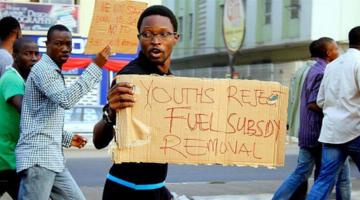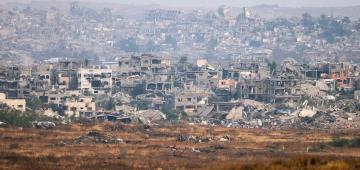Black thought is environmental thought and Black Studies is, at its core, an ecological critique.
“There is an inextricable bond between black freedom struggle, the study of black letters, and the stewardship of the Earth.”
In this series, we ask acclaimed authors to answer five questions about their book. This week’s featured author is Joshua Bennett. Bennett is the Mellon Assistant Professor of English and Creative Writing at Dartmouth College. His book is Being Property Once Myself: Blackness and the End of Man.
Roberto Sirvent: How can your book help BAR readers understand the current political and social climate?
Joshua Bennett: My hope is that Being Property Once Myself can contribute to ongoing conversations about Black social life, what Colin Dayan calls civic death, and our ongoing, collective pursuit of human dignity. Much of the book was written between 2012 and 2018, and my sense is that the decision to read this particular facet of the Black aesthetic tradition—i.e., the use of animality in 20th and 21st century novels and poetry—was influenced a great deal by the public attention directed in this period towards the State-sanctioned, ritual killings of Black people by police officers, security guards, and vigilantes.
When I turned to write not only about animal figures, but animalization as a social, historical, and psychic process, it was always with the ever-proliferating names of the slain in mind. The irreducible fact of Mike Brown’s body in the street. The assertion by community residents that he was left there like an animal, or else without the considerations that might be afforded to various animals considered kin within the dominant social contexts of an anti-black world. My book is interested in the creative, counter-hegemonic, and seemingly counterintuitive ways that Black writers have responded to this discourse through an embrace of animal figures, and a refusal to think of nonhuman life-worlds solely as sites of denigration and destruction.
What do you hope activists and community organizers will take away from reading your book?
I hope activists and community organizers take from my book a sense that there is an inextricable bond between black freedom struggle, the study of black letters, and the stewardship of the Earth. And what’s more, that we are part of a long tradition in which planetary concerns have always been at the forefront. Frederick Douglass, Harriet Jacobs, Henry Bibb, Alice Walker, Toni Morrison: these are environmental thinkers. In Douglass’s case in particular, there are any number of moments throughout his oeuvre where the interior lives and material conditions of animals are at the very forefront of his work. Black thought is environmental thought. Black Studies is, at its core, an ecological critique. And so a dream of mine is that we might continue to cultivate collaborative spaces in which artists, activists, organizers, and academics are critically re-working our relationship to the planet through the lens of blackness; using that particular position as a launchpad from which to desediment the ideologies which not only circumscribe black life, but are at the core of systems actively working toward the wanton destruction of vulnerable life on Earth.
We know readers will learn a lot from your book, but what do you hope readers will un-learn? In other words, is there a particular ideology you’re hoping to dismantle?
At one level, I’m hoping we can finally do away with the notion that Black writers, artists, and activists have not been historically committed to environmental justice, the flourishing of nonhuman life, and any number of larger philosophical questions pertaining to the natural world. That’s absolute nonsense. This complex, nuanced, fraught relationship to nonhuman life, and animal life in particular, is part of our intellectual inheritance. For people that we were once legally considered living commodities, how could we not have developed these robust ways of thinking about other forms of life likewise denied interiority, spirit, imagination?
I’m also trying to assert the importance of poetry in the public sphere, and the need for a re-commitment to its study within our institutions. Though the bulk of the book focuses on novels, I’m fairly attentive to poetry throughout (with appearances from contemporary poets like Carl Phillips, Major Jackson, Patricia Smith and Tara Betts, as well as an entire chapter dedicated to the role of sharks in African American poetry). This in no small part because poetry was the first genre I ever loved or worked in with any real frequency. Before I wrote essays, or short stories, I penned poems and improvised sermons I would share with family. In my all-black elementary school in Harlem, The Modern School, we recited the Black National Anthem (“Lift Every Voice and Sing”) each morning. All this to say: part of what I hope to emphasize with both this book and another pair of projects I am currently working on—Being Property Once Myself is the first in an imagined trilogy on the animal, mineral and vegetable kingdoms—is just how important poetry is not only within the universe of black letters, but to black social life as such.
Who are the intellectual heroes that inspire your work?
There are so many! June Jordan, Imani Perry, Sylvia Wynter, Lucille Clifton, Hortense Spillers, Joy James, James Baldwin, Alfred North Whitehead, Gwendolyn Brooks, Ed Roberson, the list goes on. Each of these thinkers has written work that is absolutely indispensable for me, and daily guides my approach as a writer, scholar, performer, teacher.
Jordan’s work in particular, I would say, animates the way I approach writing for both the page and the classroom alike. Not only the poems, and the essays, which are spectacular (Jordan is a Mount Rushmore American essayist), but also her work teaching a Saturday workshop for children in New York, as well as her longstanding, public poetry initiative in Berkeley, California: Poetry for the People. In the fall, I’ll be teaching a class by the same name at Dartmouth that draws from the program’s methodology.
I first encountered Jordan’s writing as a graduate student, reading her essay collection, Some of Us Did Not Die and being utterly transformed by it. After that, Civil Wars. By the time I got to the poems I was convinced. This was one of the most important, under-assigned writers in the contemporary study of African American literature. I have done my best in the time since, whenever I can, to lift her name to the air.
In what way does your book help us imagine new worlds?
My book gestures toward a way of thinking human-nonhuman relation, largely through the lens of Black literary studies, that is fundamentally antithetical to a certain, dominant vision of human being and becoming predicated upon extraction, individuation, and dominion. At the disciplinary level, the book is intended to extend an already-existing conversation at the intersection of black studies and ecological criticism; one which centers the historical importance of plant and animal life within the realm of black thought. But in a much more expansive sense, I want us to imagine—alongside authors both dead and living in our tradition—our planet transformed by abolitionist imagination. A world without prisons, cages, carceral practices and protocols of all kinds. I want us to read, organize, gather, dream, with our attention towards the Earth and not think that praxis easily extricated from the work of black liberation. In this sense, the worlds I want us to imagine, the other worlds anchoring and animating your question, are both already here and just beyond the horizon.
My hope is that the book can be a useful instrument on this front; to help us build what we need with what we already have at-hand. To remind us that we are not alone, and that we do not labor in vain. The lived experience of blackness is sociality beyond the boundary of species, objecthood, death. From that position, one which is often said to be nothing at all, anything is possible.
Roberto Sirvent is Professor of Political and Social Ethics at Hope International University in Fullerton, CA, and an Affiliate Scholar at Yale University’s Interdisciplinary Center for Bioethics, where he directs the Race, Bioethics, and Public Health Project. He is co-author, with fellow BAR contributor Danny Haiphong, of the book, American Exceptionalism and American Innocence: A People’s History of Fake News—From the Revolutionary War to the War on Terror.
COMMENTS?
Please join the conversation on Black Agenda Report's Facebook page at http://facebook.com/blackagendareport
Or, you can comment by emailing us at comments@blackagendareport.com



















